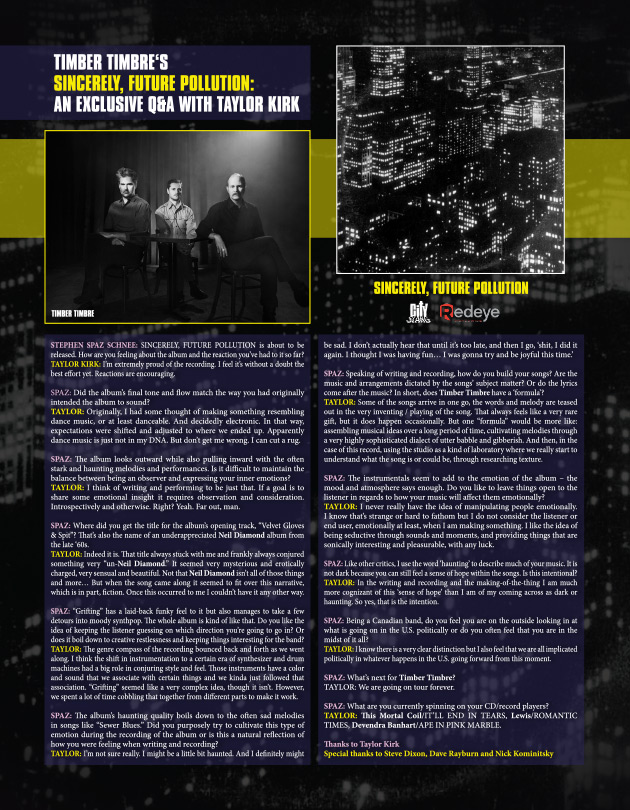SINCERELY, FUTURE POLLUTION
STEPHEN SPAZ SCHNEE: SINCERELY, FUTURE POLLUTION is about to be released. How are you feeling about the album and the reaction you’ve had to it so far?
TAYLOR KIRK: I’m extremely proud of the recording. I feel it’s without a doubt the best effort yet. Reactions are encouraging.
SPAZ: Did the album’s final tone and flow match the way you had originally intended the album to sound?
TAYLOR: Originally, I had some thought of making something resembling dance music, or at least danceable. And decidedly electronic. In that way, expectations were shifted and adjusted to where we ended up. Apparently dance music is just not in my DNA. But don’t get me wrong. I can cut a rug.
SPAZ: The album looks outward while also pulling inward with the often stark and haunting melodies and performances. Is it difficult to maintain the balance between being an observer and expressing your inner emotions?
TAYLOR: I think of writing and performing to be just that. If a goal is to share some emotional insight it requires observation and consideration. Introspectively and otherwise. Right? Yeah. Far out, man.
SPAZ: Where did you get the title for the album’s opening track, “Velvet Gloves & Spit”? That’s also the name of an underappreciated Neil Diamond album from the late ‘60s.
TAYLOR: Indeed it is. That title always stuck with me and frankly always conjured something very “un-Neil Diamond.” It seemed very mysterious and erotically charged, very sensual and beautiful. Not that Neil Diamond isn’t all of those things and more… But when the song came along it seemed to fit over this narrative, which is in part, fiction. Once this occurred to me I couldn’t have it any other way.
SPAZ: “Grifting” has a laid-back funky feel to it but also manages to take a few detours into moody synthpop. The whole album is kind of like that. Do you like the idea of keeping the listener guessing on which direction you’re going to go in? Or does it boil down to creative restlessness and keeping things interesting for the band?
TAYLOR: The genre compass of the recording bounced back and forth as we went along. I think the shift in instrumentation to a certain era of synthesizer and drum machines had a big role in conjuring style and feel. Those instruments have a color and sound that we associate with certain things and we kinda just followed that association. “Grifting” seemed like a very complex idea, though it isn’t. However, we spent a lot of time cobbling that together from different parts to make it work.
SPAZ: The album’s haunting quality boils down to the often sad melodies in songs like “Sewer Blues.” Did you purposely try to cultivate this type of emotion during the recording of the album or is this a natural reflection of how you were feeling when writing and recording?
TAYLOR: I’m not sure really. I might be a little bit haunted. And I definitely might be sad. I don’t actually hear that until it’s too late, and then I go, ‘shit, I did it again. I thought I was having fun… I was gonna try and be joyful this time.’
SPAZ: Speaking of writing and recording, how do you build your songs? Are the music and arrangements dictated by the songs’ subject matter? Or do the lyrics come after the music? In short, does Timber Timbre have a ‘formula’?
TAYLOR: Some of the songs arrive in one go, the words and melody are teased out in the very inventing / playing of the song. That always feels like a very rare gift, but it does happen occasionally. But one “formula” would be more like: assembling musical ideas over a long period of time, cultivating melodies through a very highly sophisticated dialect of utter babble and gibberish. And then, in the case of this record, using the studio as a kind of laboratory where we really start to understand what the song is or could be, through researching texture.
SPAZ: The instrumentals seem to add to the emotion of the album – the mood and atmosphere says enough. Do you like to leave things open to the listener in regards to how your music will affect them emotionally?
TAYLOR: I never really have the idea of manipulating people emotionally. I know that’s strange or hard to fathom but I do not consider the listener or end user, emotionally at least, when I am making something. I like the idea of being seductive through sounds and moments, and providing things that are sonically interesting and pleasurable, with any luck.
SPAZ: Like other critics, I use the word ‘haunting’ to describe much of your music. It is not dark because you can still feel a sense of hope within the songs. Is this intentional?
TAYLOR: In the writing and recording and the making-of-the-thing I am much more cognizant of this ‘sense of hope’ than I am of my coming across as dark or haunting. So yes, that is the intention.
SPAZ: Being a Canadian band, do you feel you are on the outside looking in at what is going on in the U.S. politically or do you often feel that you are in the midst of it all?
TAYLOR: I know there is a very clear distinction but I also feel that we are all implicated politically in whatever happens in the U.S. going forward from this moment.
SPAZ: What’s next for Timber Timbre?
TAYLOR: We are going on tour forever.
SPAZ: What are you currently spinning on your CD/record players?
TAYLOR: This Mortal Coil/IT’LL END IN TEARS, Lewis/ROMANTIC TIMES, Devendra Banhart/APE IN PINK MARBLE.
Thanks to Taylor Kirk
Special thanks to Steve Dixon, Dave Rayburn and Nick Kominitsky
SINCERELY, FUTURE POLLUTION
4.7.17


